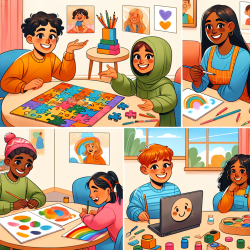Introduction
In the realm of special education and therapy, understanding the unique challenges faced by marginalized communities is crucial for effective intervention and support. The research article titled "Alcohol Misuse and Associations with Childhood Maltreatment and Out-of-Home Placement among Urban Two-Spirit American Indian and Alaska Native People" provides valuable insights into the complex interplay between childhood experiences and adult behaviors within this community. This blog aims to distill the findings of the research and suggest ways practitioners can improve their skills by implementing these insights or pursuing further research.
Understanding the Context
The study highlights the significant rates of alcohol misuse among two-spirit American Indian and Alaska Native (AI/AN) individuals, a group that faces unique cultural and social challenges. The term "two-spirit" refers to a person who embodies both masculine and feminine spirits, a concept embraced by some Indigenous cultures. This identity often intersects with experiences of racism, sexism, and homophobia, contributing to heightened vulnerabilities.
Key Findings
- High prevalence of alcohol misuse: 72.3% of men and 62.4% of women engaged in hazardous and harmful alcohol use.
- Significant childhood maltreatment: Physical abuse was prevalent among male drinkers (62.7%), while emotional abuse was common among female drinkers (71.8%).
- Out-of-home placement: High percentages of men (39%) and women (47%) reported experiences such as boarding school attendance and foster care.
Implications for Practitioners
For practitioners working with two-spirit AI/AN individuals, these findings underscore the importance of culturally sensitive approaches that acknowledge the historical and social contexts of their clients' experiences. Here are some strategies to consider:
- Cultural Competency: Develop an understanding of the two-spirit identity and its cultural significance. Engage in continuous education about AI/AN histories and traditions to build trust and rapport.
- Trauma-Informed Care: Recognize the impact of historical trauma and childhood maltreatment on mental health and substance use. Tailor interventions to address these traumas and promote healing.
- Holistic Approaches: Incorporate traditional healing practices and community resources into therapy. Encourage clients to connect with their cultural roots and community for support.
Encouraging Further Research
The study calls for additional research to explore the mediators and moderators of the relationship between childhood exposures and alcohol misuse. Practitioners can contribute to this body of knowledge by:
- Participating in Research: Collaborate with academic institutions and research bodies to conduct studies that explore the nuances of two-spirit experiences.
- Data Collection: Gather data on client outcomes and share findings with the broader research community to inform evidence-based practices.
Conclusion
By embracing a culturally sensitive and trauma-informed approach, practitioners can play a pivotal role in supporting two-spirit AI/AN individuals on their journey to recovery and empowerment. The insights from this research not only enhance our understanding but also inspire us to create more inclusive and effective therapeutic environments.
To read the original research paper, please follow this link: Alcohol Misuse and Associations with Childhood Maltreatment and Out-of-Home Placement among Urban Two-Spirit American Indian and Alaska Native People.










